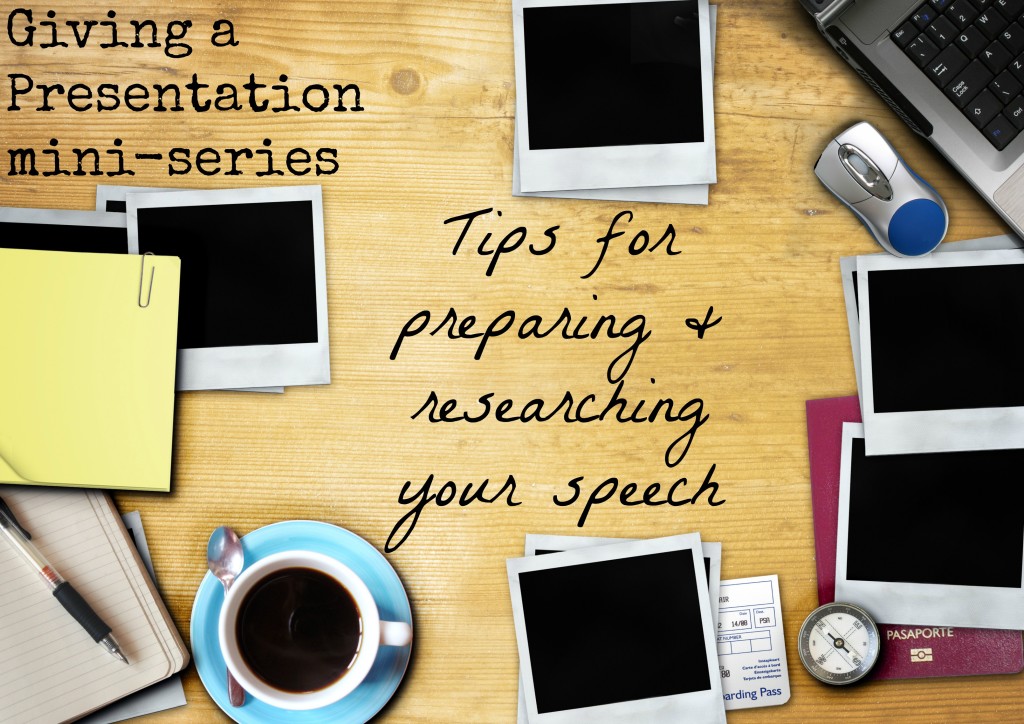Check out Part One: Introduction to Public Speaking if you missed it on Tuesday!
Preparing and Researching the Speech
Before the actual act of presenting the speech, preparing for it is essential. Ideally, you want to know your speech so well that you could easily talk about the subject for twice as long as the time allotted to you.
After any kind of presentation, there is usually some form of interaction between presenter and audience, often in the form of a question-and-answer session. It is during this period that the audience can really tell if you know your subject or if your entire speech was based around information that you don’t actually understand. How well you respond to their questions and the richness that you give to your answers will provide them with a solid knowledge of whether you are reputable or if your speech was simply a bunch of words hastily strung together half an hour before.
Knowing your topic and knowing your audience are both essential to presentation preparation:
Knowing your topic involves a working understanding of the topic itself. This includes the history and future of your topic as well as what’s going on with it right now. It also includes knowing the inherent problems within the subject, and the counter arguments against such problems so that you can defend your topic.
Statistics and factual information from reputable sources are great tools to support your argument. Interviewing “experts” or even laypeople about the subject beforehand, and having personal experience with the topic, also contribute to a greater understanding of it. You should be aware of the positives and negatives of it and have some idea about why this topic is so important (and relevant!) to your audience.
Knowing your audience involves knowing who the audience is and what they want. You can formulate your speech based on your audience’s beliefs. If you know that they will be sympathetic to your mission, you can likely present in a more informal fashion, appealing to the audience’s emotions. If it’s a tough audience that you’re up against, it is better to adopt a professional demeanor and to rely on statistics and data to support your material.
What does your audience want? What are they interested in? Why do they care about your presentation? You need to know all of these things before deciding on the angle that your speech will take.
Tips for researching and preparing your speech:
It is always good to have plenty of variety in your research. Check out as many different sources as you can so that your knowledge is as well-rounded as it can be. Talk to people on both sides of the issue, check out Internet sources, academic journals, books, magazines, and other documents, and get as much hands-on experience as you can in the field of your topic. You want to know your information so well that if someone asked you to present your topic in a few different ways with several opposing perspectives, you’d be able to take on the challenge.
While you’re researching and preparing for the speech, be sure to time yourself practicing it. Even if you don’t have an actual “time restriction,” it is good to have an idea of how long your speech is.
Practice your presentation in front of test subjects to make sure that they understand what you are trying to convey and so that you know that your information is presented clearly. Practice in front of a mirror to ensure that your delivery—the way you gesture, your stance, and your facial expression—is appropriate. If you are using visual aids, always practice with them. If it is possible, you should go to the room you will be presenting in to check that you know where all of the presentation equipment is so that you know ahead of time how to access and use it.
Above all, when researching and preparing for your presentation, know the information. If something goes wrong in the speech and your cue cards fail you, you should be able to have enough of a working understanding of the topic to draw from your brain so that you aren’t relying on cue cards and visual aids. Understand your topic rather than just memorizing it!

Sagan, while all this is true, I cannot speak enough to knowing your topic and practicing your presentation. My last presentation was a topic I believed in, but I did not know intimately. While it came together well, the amount of practice I had to put into it was significantly greater than past presentations. Of course, you can never practice too much, but if you plan topics that you know better, it all comes together quite well.
Great post – now to read the first in the series. 🙂
[…] Part Two: Preparing and Researching the Speech […]
Steve- I agree! If your topic of choice is something that you really KNOW, you’ll be much better off. I have chosen topics in the past that I didn’t truly understand and even though I tried to research them, I found that the overall presentation was poor. When I gave presentations for topics that I had a good grasp of, I was able to add snippets of information off the cuff just because there was a lot more extra knowledge in my head. Knowing the topic really well- and having a lot of conviction about your argument- can also make us feel MUCH more comfortable with speaking in a public setting.
[…] Part Two: Preparing and Researching the Speech […]
[…] Part Two: Preparing and Researching the Speech […]
[…] Part Two: Preparing and Researching the Speech […]